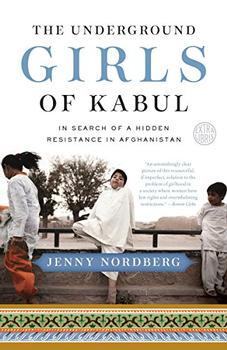Summary | Excerpt | Reading Guide | Discuss | Reviews | Beyond the Book | Readalikes | Genres & Themes | Author Bio

Critics' Opinion:
Readers' Opinion:
First Published:
Sep 2014, 288 pages
Paperback:
Jul 2015, 288 pages
 Book Reviewed by:
Book Reviewed by:
Kim Kovacs
Buy This Book
The literacy rate is no more than 10 percent in most areas, and many unfounded truths swirl around without being challenged. Among them is the commonly held belief that a woman can choose the sex of her unborn baby simply by making up her mind about it. As a consequence, a woman's inability to bear sons does not elicit much sympathy. Instead, she is condemned both by society and her own husband as someone who has just not desired a son strongly enough. Women, too, often resort to blaming their own bodies and weak minds for failing to deliver sons.
The character flaws often add up about such a woman in the eyes of others: She is surely difficult and obnoxious. Perhaps even evil. The fact that the father actually determines the sex of a child, as the male sperm carries the chromosome makeup for each child and determines whether a boy or a girl will be born, is unknown to most.
For Azita, the lack of a son stood to impede all she was trying to accomplish as a politician. When she arrived with her family in Kabul in 2005, sneers and suspicion about her lack of a son soon inevitably extended to her abilities as a lawmaker and a public figure. Her visitors would offer their condolences when they learned about her four daughters. She found herself being cast as an incomplete woman. Fellow parliamentarians, constituents, and her own extended family were unsympathetic: How could she be trusted to accomplish anything at all in politics when she could not even give her husband a son? Without a boy to show off to the constant stream of visiting political power brokers, her husband also grew increasingly embarrassed.
Azita and her husband approached their youngest daughter with a proposition: "Do you want to look like a boy and dress like a boy, and do more fun things like boys do, like bicycling, soccer, and cricket? And would you like to be like your father?"
She absolutely did. It was a splendid offer.
All it took was a haircut, a pair of pants from the bazaar, and a denim shirt with "superstar" printed on the back. In a single afternoon, the family went from having four daughters to being blessed with three little girls and a spiky-haired boy. Their youngest would no longer answer to Mahnoush, meaning "moonlight," but to the boy's name Mehran. To the outside world—and especially to Azita's constituents back in Badghis—the family was finally complete.
Some, of course, knew the truth. But they, too, congratulated Azita. Having a made-up son was better than none, and people complimented her on her ingenuity. When Azita traveled back to her province—a more conservative place than Kabul—she took Mehran with her. In the company of her six-year-old son, she found she was met with more approval.
The switch also satisfied Azita's husband. Tongues would now cease to wag about this unlucky man burdened with four daughters, who would need to find husbands for all of them, and have his line end with him. In Pashto, Afghanistan's second official language, there is even a deprecating name for a man who has no sons: He is a meraat, referring to the system where an inheritance, such as land assets, is almost exclusively passed on through a male lineage. But since the family's youngest took on the role of a son the child has become a source of pride to her father. Mehran's revised status has also afforded her siblings considerably more freedom, as they can leave the house, go to the playground, and even wander to the next block, if Mehran is along as an escort.
There was one additional reason for the transition. Azita says it with a burst of low laughter, leaning in a little closer to disclose her small act of rebellion: "I wanted to show my youngest what life is like on the other side."
That life can include flying a kite, running as fast as you can, laughing hysterically, jumping up and down because it feels good, climbing trees to feel the thrill of hanging on. It is to speak to another boy, to sit with your father and his friends, to ride in the front seat of a car and watch people out on the street. To look them in the eye. To speak up without fear and to be listened to, and rarely have anyone question why you are out on your own in comfortable clothes that allow for any kind of movement. All unthinkable for an Afghan girl.
Excerpted from The Underground Girls of Kabul by Jenny Nordberg. Copyright © 2014 by Jenny Nordberg. Excerpted by permission of Crown. All rights reserved. No part of this excerpt may be reproduced or reprinted without permission in writing from the publisher.





The House on Biscayne Bay
by Chanel Cleeton
As death stalks a gothic mansion in Miami, the lives of two women intertwine as the past and present collide.

The Flower Sisters
by Michelle Collins Anderson
From the new Fannie Flagg of the Ozarks, a richly-woven story of family, forgiveness, and reinvention.

The Funeral Cryer by Wenyan Lu
Debut novelist Wenyan Lu brings us this witty yet profound story about one woman's midlife reawakening in contemporary rural China.
Your guide toexceptional books
BookBrowse seeks out and recommends the best in contemporary fiction and nonfiction—books that not only engage and entertain but also deepen our understanding of ourselves and the world around us.